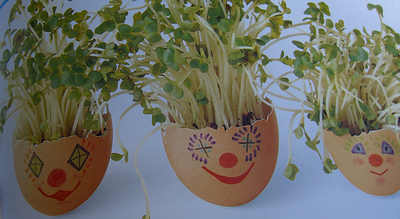
Eggheads sprout good ideas - and a healthier Canada. Image and concept courtesy of Youthwork Practice's craft page.
The latest issue of MacLean’s magazine (August 16, 2010) has a can’t-be-missed article about the direction Stephen Harper’s leadership is taking, and Canadians who believe in the value of critical thinking should pay attention. “Cracking Eggheads”, with a byline by Paul Wells, calls itself an article about “why Stephen Harper thinks he’s smarter than the experts on everything”.
The scary thing, though, is how the current system of government lends itself pretty handily to situations where it’s in a politician’s best interests to do what looks good on TV instead of what experts have shown will actually bring about the desired result. This could turn into a long-term trend in no time flat.
Harper is a politician who wants to continue to have power, so he’s focused on the optics of his decision-making. It’s particularly strategic, now that Ignatieff is the Liberal leader, for him to contrast himself against the “ivory-tower egghead” image by presenting himself as a salt-of-the-earth, keep-it-simple sort of leader. Anybody who’s distrustful of academia will gravitate towards Harper almost instinctively.
Here’s an example of Harper’s modus operandi taken directly from Paul Wells’ article: economic experts designed a comprehensive multi-year system of tax cuts for investment and income, tailor-made for Canada to gain an economic boost. The Conservatives touted it in 2004 and lost the election. In 2006, they decided to simplify and switched to a simple GST cut. Sure, the experts pretty much unanimously agreed it was a dumb idea. But voters resented GST and liked the idea of paying less of it, so Stephen Harper’s popularity spiked. Says Wells: “The GST promise helped them win, and Harper’s team learned to treat conventional wisdom among specialists with a certain disdain.”

Let them eat cake. Image courtesy of Raw Food Nation. (Click for recipe!)
Did we create this by our electoral choices? Are we, the Canadian people, at fault here? I’m not sure we should let ourselves off lightly and focus on criticizing Harper. This is politics at the level of electing a student body president, where popularity trumps good ideas and solid research. If we’re voting based on who’s telling us what we want to hear, rather than based on smart decision-making and leadership, we probably deserve what we get. And we give politicians no reason to approach us with solid, expert-backed ideas if we’re willing to vote for whatever guy is going to promote an easy-way-out option. It might not be a good solution, but does it ever look like fun to us. It’s the reason why the grapefruit diet will always be less popular than the chocolate-cherry-cheesecake weight loss plan.
Do I really need to point out that its popularity doesn’t make it a good decision?
To be fair, and to complicate the mix somewhat, we also have to think critically about why Maclean’s is criticizing Harper’s thinking. It’s certainly possible (maybe even probable) for a journalist or media outlet to exhibit bias. But if the facts reported are correct, Harper’s government is making political decisions that conflict with expert consensus across a broad range of issues – crime, drug control, taxation, climate change, even data collection itself. He’s taking the lazy road. But the job of any head of state is (ideally) to set up our society and government in such a way that our country can achieve its goals and succeed. That’s different from a politician’s job. A head of state has to set aside political ambition and run the country in the smartest way possible. But a politician’s only job is to win.
Stephen Harper is a politician, not a head of state. He tells us what we want to hear, and we lap it up.
But I for one am quite concerned about the implications of a government lacking the humility to accept the advice of experts on policies that touch on their own areas of expertise. What’s more, experts are impaired in their ability to monitor policy success without a comprehensive census, so we may not even be able to find out if the policies our so-called leaders select for us have done any good for Canadians. Without any hard data, we’re arguing in the realm of opinions instead of making smart choices about what to do. Taking the teeth out of the census has crippled Canadian experts. Which doesn’t matter, I suppose, if nobody’s listening to them anyway.
Except it should matter, and I’m even more concerned that our government values their short-term goal – staying in political power as long as possible – more than the nation’s long-term goal – moving towards a better future for all Canadians. We elected these people. We voted for politicians who have long stopped caring how the history books will describe them once they’re gone. They don’t care about their legacy, and neither do we. Their main interest is in what web polls and the blogosphere are saying – their level of popularity. And by swallowing their sweet-sounding rhetoric instead of looking closely at expert critiques of their policies, we’re telling them that they’re right to do it. Making Canada a better country doesn’t matter. Image is everything.
If we’re such a short-sighted society, being led by short-sighted leaders, how can we possibly survive the challenges that face us in the near future?
This has become a society where information mows you down every time you step out the front door – and if you don’t, it’ll come through your window and find you. It’s past time for us to learn how to sift through that information and decide what constitutes real knowledge and what’s just talk. Gathering knowledge is smart political action. We have to think critically, inform ourselves about the issues, and refuse to make decisions based on sound bytes and shortcuts. Maybe if we make long-term consideration a priority, we can turn the tides and elect a government willing to do the same for Canada.
I’m not much of a drinker, but believe me, I’d drink to that.

Cheers, Canada! Image courtesy of Maclean's online.









